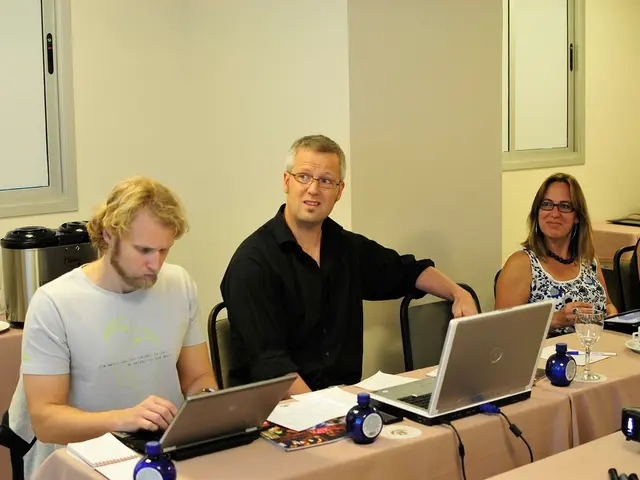The Left Party's Journey to the Backbenches in the Bundestag
Two minutes of speaking time and a seat in the back row - this is now the Left Party's new norm in the Bundestag following the dissolution of their parliamentary group. Notable figures like party leader Janine Wissler and former group leader Dietmar Bartsch listened to Chancellor Olaf Scholz's (SPD) statement and the subsequent debate from the back row.
Gregor Gysi, another prominent member, was the 13th speaker, a placement that required a long walk to the lectern with a smile on his face. His speaking time was limited to just two minutes. He used this opportunity to call for an immediate ceasefire in Ukraine and the protection of the Palestinian civilian population in Gaza.
A Building Site in the Parliament
Gysi's path to the lectern passed by what appeared to be a construction site. His former parliamentary group's seats, located on the far left of the lectern, were no longer there. The first two benches had been removed - they were the seats of the parliamentary group leadership, a position the Left Party no longer holds.
Sahra Wagenknecht and Her Allies
The Left Party MPs can thank former colleague Sahra Wagenknecht and nine other departing MPs for this new situation. The Left Party has lost its parliamentary group status due to the reduction in the number of MPs, now at just 28. The remaining members and the new "Sahra Wagenknecht Alliance" aim to be recognized as a group in the Bundestag, a move that would grant them more rights and financial support. The decision on this matter falls on the Council of Elders.
The AfD's Call for Pau's Resignation
The dissolution of the Left Party's parliamentary group could potentially cost Petra Pau her office as Vice-President of the Bundstellag. The AfD, which has unsuccessfully sought a vice-presidential post for two consecutive terms, has pushed for Pau's resignation through a motion. However, Pau has thus far refused to step down, and the CDU/CSU parliamentary group supports her continuation in office.
Related Articles:
Gysi's Determined Appeal
Despite the challenges, Gysi relished the opportunity to address the Bundestag. Smiling, he covered the long distance to the lectern and delivered his plea for an immediate ceasefire in Ukraine and the protection of the Palestinian civilian population. His calm and determined appeal stood in stark contrast to the back row from which he spoke.
The Loss of Influence and Status
The Left Party's loss of parliamentary group status, along with the removal of the first two benches closest to the lectern, symbolizes more than just a change in seating arrangements. It represents a significant loss of influence and representation in the German parliament. The party now has to contend with limited speaking rights, a reduced role in committee work, and no official faction within the Bundestag.
However, the party is not without hope. They are relying on "Mission Silberlocke" (Silver Locks), a strategy aimed at securing at least three direct mandates in individual constituencies. If successful, this would allow the Left Party to re-enter the Bundestag even without clearing the 5% threshold for proportional representation.
Enrichment Data:
- Loss of Official Faction: Following the split led by Sahra Wagenknecht, the Left Party lost its official faction in the Bundestag, resulting in the loss of formal representation and leadership roles within the parliament.
- Impact on Speaking Rights: Without an official faction, the Left Party's members do not have the same level of formal representation and speaking rights within the Bundestag.
- Gregor Gysi's Role: Despite the loss of formal representation, prominent figures like Gregor Gysi continue to play a significant role in the German political landscape.
- Mission Silberlocke: The Left Party is relying on "Mission Silberlocke" (Silver Locks), a strategy to win at least three direct mandates in individual constituencies. This could allow the party to re-enter the Bundestag and regain some of its lost influence.








